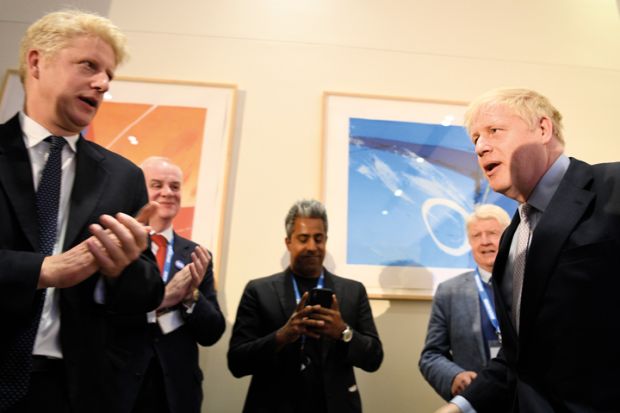Vice-chancellors have called on Jo Johnson to clarify his stance on a no-deal Brexit after his brother Boris’ move to suspend Parliament was seen as increasing the chances of the UK leaving the European Union without an agreement.
Jo Johnson, who was reappointed as universities minister in July after his brother became prime minister, voted Remain in the 2016 referendum. As universities minister from 2015 to January 2018, he pledged to work to implement the result – and to mitigate the impact on the higher education sector – but resigned from the Department of Transport last November in order to call for a second Brexit referendum.
After resigning, Jo Johnson said that a no-deal Brexit would “inflict untold damage on our nation”, although he suggested that it “may well be better than the never-ending purgatory” that he said Theresa May’s proposed deal would result in.
Since returning to government, however, Mr Johnson has stayed silent on the issue.
Boris Johnson has said that the UK will leave the EU “do or die” on 31 October, and critics have interpreted the prorogation of Parliament for five weeks from mid-September as severely limiting MPs’ options to prevent the UK crashing out with no deal.
Speaking to Times Higher Education, sector leaders said that Jo Johnson understood the sector and was a strong advocate for it, but questioned his role in an administration that was edging towards no deal.
Leaving without a deal would trigger significant uncertainty for European academics and students in the UK, and would probably result in the country being excluded from EU research framework programmes – worth £1 billion annually to British universities – and the Erasmus+ mobility scheme.
“Jo Johnson needs to come out and say what he thinks,” one vice-chancellor told THE.
Bill Rammell, vice-chancellor of the University of Bedfordshire and a former Labour higher education minister, said: “I understand party loyalty and the arguments in favour of working on the inside, rather than protesting on the outside, but this is the biggest issue we have ever faced.
“I think that unless [Jo Johnson] believes that this high-stakes brinkmanship will get us a deal, and resigns if it doesn’t, then he will contradict his previously respected opposition to no deal, which he made clear would ‘inflict untold damage on our nation’.”
Other vice-chancellors said that it was important for the sector for Jo Johnson to stay in post. Colin Riordan, vice-chancellor of Cardiff University, said “we know that [Jo Johnson] really does want to achieve an understanding with EU”.
“Given the options that are out there, he is the best option. He’s more influential. He understands the sector, even if we don’t agree on everything,” Professor Riordan said.
David Green, vice-chancellor of the University of Worcester, said that institutions should respond to the prorogation plan by organising “teach-ins” and “democracy days”.
“We should be actively encouraging students, staff and all in our large, influential university communities to come together, discuss and debate all the issues with invited speakers from across the spectrum, as well as to register and then vote in the inevitable autumn general election,” Professor Green said.
“Now is the time to do all we can to pursue truth and reason. By doing so we will help ensure that parliamentary democracy and democratic values triumph.”
后记
Print headline: Jo Johnson ‘needs to say what he thinks’ on Brexit




